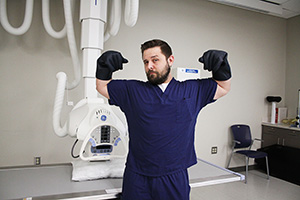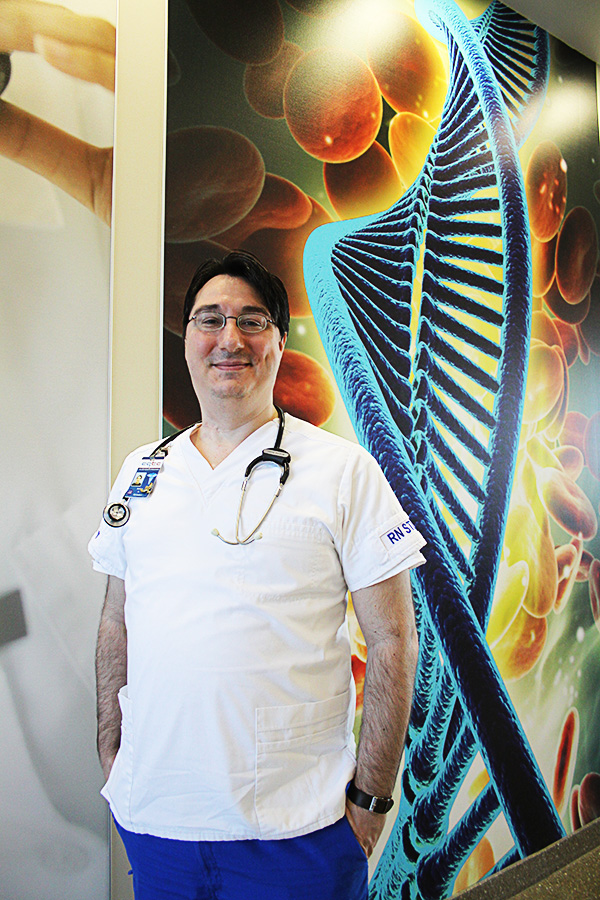 Warner Robins, Ga. – A pair of male students nearing graduation in health sciences programs at Central Georgia Technical College (CGTC) are preparing to enter the local healthcare industry equipped with extensive hours of clinical practice and theoretical instruction, but it is their training in workplaces dominated by women that has them learning the most.
Warner Robins, Ga. – A pair of male students nearing graduation in health sciences programs at Central Georgia Technical College (CGTC) are preparing to enter the local healthcare industry equipped with extensive hours of clinical practice and theoretical instruction, but it is their training in workplaces dominated by women that has them learning the most.
In May, Andrew Rader and David Hall will both become graduates of an Associate Degree in Nursing and Radiologic Technology program, respectively. Both programs are part of a wide-range of enrollment and career cluster data that the National Alliance for Partnerships in Equity (NAPE) delivers to Career and Technical Education (CTE) programs, including the Technical College System of Georgia (TCSG), where it defines non-traditional career paths for males. Essentially, if less than 25 percent of one gender is employed in a given regional workplace it makes that career non-traditional for the area. The data also designates paths for females.
“Females on the whole tend to be more compassionate,” Rader said. “They can teach you to be a good caregiver, and learning from a female shouldn’t deter a man to learn how to be a good care giver.”
The topic of non-traditional employment or workplace diversity was not something Rader or Hall actively considered during clinical hours or sitting in a classroom. Obviously, both could look around on any given day and see a 10:2 ratio or similar, and know they were the elephant disguised as a man in the room.
Both pensively view their advocacy on the matter as tied to their performance and professionalism. Do well, earn trust, and the first line of attack to breaking down reservations is evaded.
“Being a man, you have to be aware you provide diversity for a certain workforce,” said Rader, who after a stint at another college, is glad to complete a nursing program.
“Patients give it more thought than the actual nurses do. They have reservations. Nurses are professionals, and ideally so are your classmates. They treat you as one.”
Both Rader and Hall said instructors, classmates, and co-workers have welcomed them, and appreciate the balance their presence brings to a unit or the strong hand it lends when a patient needs moving.
“Everybody seems pretty welcoming to have a guy walk in,” Hall said, who has been told at virtually every clinical site he’s worked that men tend to do well in the orthopedic recovery (OR) wing. “It is about not treating anybody different.”
“I believe that if you are a good at what you do you can aspire others to be like you,” Rader said. 
The Special Populations division at CGTC works to assure students access to information regarding non-traditional career paths. Donna Dutcher and Kashatriya Eason, directors for Warner Robins and Macon Special Populations, oversee ways in which students are able to fulfill their potential, achieve equity, and have an opportunity to pursue the entire spectrum of career choices as NAPE suggests.
Foundational to both Rader and Hall’s pursuits of healthcare occupations is their desire, over everything, to help people.
In about a month, Rader will be a graduate of the first cohort in the Registered Nursing program at CGTC.
Rader, whose mom is a nurse, used to handle fraud cases at a bank and came to the realization that, although bringing someone back from financial peril is rewarding, comforting a patient through pain is the proper place for his passion.
Likewise, Hall finds dedication through service to others. A veteran of the Navy, he was a part of a relief response by United States forces to the super-typhoon in the Philippines earlier in the decade. While there, he helped as necessary, but kept feeling as if he could do more if he had a medical background.
Upon leaving the Navy, he actually enrolled in the Emergency Medical Technician program at the College, met his wife in a course, and over some time would change gears, and decide to pursue radiologic technology.
Rader and Hall are completing externships and working part-time with local hospitals respectively.
For more information on non-traditional career paths, visit Special Populations
[Photo 1] David Hall.
[Photo 2] Andrew Rader.
